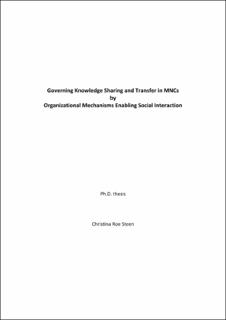| dc.description.abstract | This dissertation aims to contribute to the understanding of how multinational companies
(MNCs) use organizational mechanisms enabling social interaction to govern knowledge
sharing and transfer within the company. The international management literature has, over
recent decades, shown an increased interest in the importance of social interaction in the
government of knowledge processes and integration of units by MNCs. Even though research
provides support for the association between social interaction and the sharing and transfer
of knowledge, researchers have neither fully explained how MNCs leverage this association
nor identified the underlying mechanisms whereby social interaction positively affects related
processes and under what conditions.
The dissertation consists of three papers: one literature review and two empirical studies. The
literature review investigates how organizational mechanisms enabling social interaction are
covered in the international management literature, with a specific focus on the role of
socialization and social capital. The review identifies seven main categories covering 35
different mechanisms, which are defined as formal or informal. Additionally, the review
proposes a model for how formal and informal mechanisms are connected to socialization and
the development of social capital. The empirical papers report two different studies. The first
investigates intra-organizational learning structures that enable social interaction among
managers across borders and examines the extent of their association with strategic and HRM
structures and the institutional context of the subsidiary’s operation. This paper investigates
both company-level factors and institutional context as a macro factor influencing the focal
subsidiary. The second empirical paper investigates the micro-foundations of knowledge
sharing and transfers within formal knowledge networks in an MNC. The focus is on the
interaction between knowledge-sharing behavior and knowledge application and how these
processes are influenced by network management, structural social capital, and different
types of autonomous motivation.
Together, these papers contribute to the understanding of how MNCs use organizational
mechanisms enabling social interaction to govern knowledge sharing and transfer within the
company. | en_US |
